|
|
|
Sort Order |
|
|
|
Items / Page
|
|
|
|
|
|
|
| Srl | Item |
| 1 |
ID:
146754
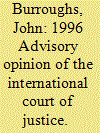

|
|
|
|
|
| Contents |
The 1996 advisory opinion of the International Court of Justice (ICJ) was the culmination of a decades-long debate on the legality of nuclear weapons. In recent years, it has shaped how international law is invoked by the initiative focused on the humanitarian impacts of nuclear weapons use and served as a foundation for the nuclear disarmament cases brought by the Marshall Islands in the court.
|
|
|
|
|
|
|
|
|
|
|
|
|
|
|
|
| 2 |
ID:
163929
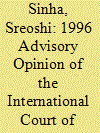

|
|
|
| 3 |
ID:
127343
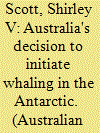

|
|
|
|
|
| Publication |
2014.
|
| Summary/Abstract |
On May 31, 2010, Australia instituted proceedings before the International Court of Justice in the case of Whaling in the Antarctic (Australia v. Japan). Although Australian politicians had for some time threatened such a course of action, the decision to proceed with international litigation took many observers by surprise, most basically because Japan appeared to be in a strong legal position and the risks associated with the case appeared greater than Australia's prospects for success. This article examines the background to the whaling dispute and suggests two ways in which litigation in the World Court may contribute to resolution of the dispute no matter the legal outcome of the case.
|
|
|
|
|
|
|
|
|
|
|
|
|
|
|
|
| 4 |
ID:
111228
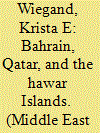

|
|
|
|
|
| Publication |
2012.
|
| Summary/Abstract |
The Hawar Islands dispute, resolved in 2001, is the only territorial dispute between two Arab states that has been resolved by the International Court of Justice (ICJ). Several factors played a role in influencing Qatar and Bahrain to resolve their dispute at the ICJ: 1) the inability of Arab states and the Gulf Cooperation Council (GCC) to mediate the dispute, 2) incentives for significant oil and natural gas reserves, and 3) incentives for bilateral and regional cooperation on salient issues between the two states. Both states have benefited significantly since the resolution of the dispute.
|
|
|
|
|
|
|
|
|
|
|
|
|
|
|
|
| 5 |
ID:
079623


|
|
|
|
|
| Publication |
2007.
|
| Summary/Abstract |
The author offers a close analysis of Article VI of the Treaty on the Non-Proliferation of Nuclear Weapons (NPT), the treaty's only article dealing with disarmament, focusing upon both its text and negotiating history, and assesses its applicability as a standard for judging treaty compliance. The author critiques comments on Article VI made by the International Court of Justice in a 1996 case as legally ill founded and conceptually incoherent as a compliance yardstick. The only interpretation of Article VI consistent with its text and history, the author argues, is that it - as it says - merely requires all states to pursue negotiations in good faith; specific disarmament steps are not required. Claims that the 2000 NPT Review Conference imposed new legal obligations for disarmament or altered the meaning of Article VI are found to be mistaken; although the conference could theoretically have adopted interpretive criteria for understanding the meaning of Article VI, it did not in fact do so. Applying his Article VI compliance standard to the case of U.S. compliance, and comparing modern circumstances with those during the Cold War, the author also describes what he says is an excellent U.S. record of Article VI compliance
|
|
|
|
|
|
|
|
|
|
|
|
|
|
|
|
| 6 |
ID:
155104
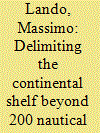

|
|
|
|
|
| Summary/Abstract |
In both Nicaragua v. Colombia cases, the International Court of Justice upheld that international tribunals may delimit the continental shelf beyond 200 nautical miles prior to the establishment of the continental shelf’s outer limits. However, both the 2012 judgment on the merits in the first case, and the 2016 judgment on preliminary objections in the second case, raise a number of controversial issues. This article discusses the contentious aspects of these two judgments. First, it argues that the ICJ’s decisions should have more strongly upheld that overlapping entitlements are a necessary precondition to maritime delimitation both within and beyond 200 nautical miles, with reference to the evaluation of evidence of entitlement provided by the parties. Second, it examines the exceptional character of the Bay of Bengal cases, as well as the persuasiveness of the “practical impasse” argument invoked by Nicaragua.
|
|
|
|
|
|
|
|
|
|
|
|
|
|
|
|
| 7 |
ID:
122782
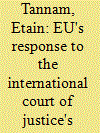

|
|
|
|
|
| Publication |
2013.
|
| Summary/Abstract |
In this essay an evaluation of the content and determinants of the EU's response to the ICJ is provided. Two core questions are addressed: firstly, did the ICJ's judgment alter EU policy towards Kosovo and Serbia and, secondly, was EU policy towards Kosovo and Serbia effective? It is argued that the EU's response to the ICJ's judgment in 2010 has been consistent and effective, but that the underlying determinants of the policy have not changed since 2008. It is argued that the EU's response to the ICJ's judgment in 2010 has been consistent and effective and that the ICJ judgment has had a catalytic effect on the EU's influence over Serbia and the Serbia-Kosovo relationship. Overall, EU policy has been effective, despite being periodically ad hoc.
|
|
|
|
|
|
|
|
|
|
|
|
|
|
|
|
| 8 |
ID:
154164
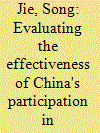

|
|
|
|
|
| Summary/Abstract |
In the process of drafting and adopting international legal documents, each participating state should ensure its participation is effective, i.e. it should ensure that its views and national interests are incorporated. However, this article argues that China's participation in the activities of the International Law Commission as well as at the International Court of Justice has not been effective, in contrast to the practice of the United Kingdom and the United States. In order to be a true leader in international affairs that has the capability to influence the course of legal developments, China should improve the quality and extent of its participation.
|
|
|
|
|
|
|
|
|
|
|
|
|
|
|
|
| 9 |
ID:
156860
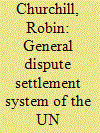

|
|
|
| 10 |
ID:
126069
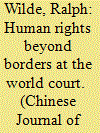

|
|
|
|
|
| Publication |
2013.
|
| Summary/Abstract |
This article uses the case study of the question of whether human rights treaty law applies extraterritorially as a means of exploring the general theme of the value of the International Court of Justice's involvement in human rights, when compared to such involvement by specialist human rights bodies. The Court's express pronouncements on the issue, in the Wall Advisory Opinion, the DRC v. Uganda judgment, and the Provisional Measures Order in Georgia v. Russia, as well as an earlier more general statement in the Namibia Advisory Opinion, are compared to determinations on the issue by specialist courts and tribunals. The article begins by setting out the broader historical context of the ICJ's involvement in human rights issues. It then analyses the different ways in which this involvement can be critically appraised, in the process making the case for the focus adopted herein, on a comparison between the role of the Court and that of specialist human rights tribunals on issues of meaning/interpretation rather than application/enforcement, and, within this, on comparative analysis concerned with the generalist/specialist distinction itself rather than the relative merits of positions taken on the substantive law. Such a focus is then deployed through a detailed critical evaluation of the Court's statements in the decisions indicated. Finally, the article summarizes the significance of the Court's determinations on the extraterritorial application of human rights law, and the broader relevance of these determinations for understanding the role of the ICJ in the field of human rights more generally.
|
|
|
|
|
|
|
|
|
|
|
|
|
|
|
|
| 11 |
ID:
078796
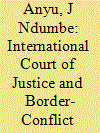

|
|
|
| 12 |
ID:
121880
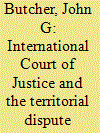

|
|
|
|
|
| Publication |
2013.
|
| Summary/Abstract |
In the early 1990s Indonesia and Malaysia were locked in a long-running and bitter dispute over the ownership of two tiny islands in the Sulawesi Sea and the associated question of maritime boundaries in this area rich in oil and gas deposits. Neither government had ever referred a dispute with another state to the International Court of Justice but in 1996 President Soeharto agreed to Malaysia's proposal to ask the ICJ to issue a ruling on the dispute between the two countries. In 1998 Indonesia and Malaysia asked the ICJ to rule on the ownership of the islands. They did not, however, ask it to rule on the far more important question of their maritime boundaries in the Sulawesi Sea. The ICJ's judgement in 2002 that the islands belonged to Malaysia therefore left that question unresolved. The article argues that because of Indonesia's experience with the ICJ and the high stakes involved for both countries any resolution of the boundary dispute - which came close to open conflict in 2005 - will almost certainly be the result of state-to-state negotiations rather than a ruling by the ICJ or any outside body.
|
|
|
|
|
|
|
|
|
|
|
|
|
|
|
|
| 13 |
ID:
000704
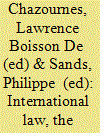

|
|
|
|
|
| Publication |
Cambridge, Cambridge University Press, 1999.
|
| Description |
xxiii, 592p.
|
| Standard Number |
0521652421
|
|
|
|
|
|
|
|
|
|
|
|
Copies: C:1/I:0,R:0,Q:0
Circulation
| Accession# | Call# | Current Location | Status | Policy | Location |
| 042030 | 341.734/CHA 042030 | Main | On Shelf | General | |
|
|
|
|
| 14 |
ID:
121798
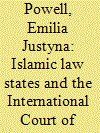

|
|
|
|
|
| Publication |
2013.
|
| Summary/Abstract |
The International Court of Justice (ICJ), as the principal judicial organ of the UN, plays an important role in peaceful resolution of international disputes. Traditionally, relations between Islamic law states, international law, and courts have been relatively tense due to the inherent link between Islamic law and the Islamic faith. Yet, several Islamic law states recognize the ICJ's compulsory and compromissory jurisdiction. This article asks: Why do some Islamic law states extend support to the International Court of Justice, while others turn away from the Court? I argue and empirically demonstrate that specific characteristic of Islamic law can explain variation of Islamic law states' preferences towards the ICJ. After providing original data on the characteristics of Islamic legal structures, I systematically compare pertinent rules of international law and Islamic law, focusing on similarities and differences between the two. Islamic law features such as respect for legal scholarship and peaceful resolution of disputes are compatible with principles embraced by the ICJ. Islamic law states that incorporate these norms are supportive of the Court. In contrast, Islamic law states that directly adopt sharia as the law of the land and incorporate sharia in their education systems are less open to the ICJ's adjudication.
|
|
|
|
|
|
|
|
|
|
|
|
|
|
|
|
| 15 |
ID:
178016
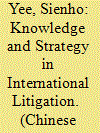

|
|
|
|
|
| Summary/Abstract |
This short review essay comments on Hugh Thirlway’s outstanding short book The International Court of Justice and expresses appreciation for his expert knowledge about the International Court of Justice (the Court or ICJ) and its law and procedure. The Essay further observes that, in addition to knowledge about the Court and its law and procedure, other factors may have a great role to play in litigation strategy. As such, litigation strategy is a matter not susceptible to broad-brush commentary, but demands tough soul-searching, in the light of all relevant circumstances and of the larger goals to be pursued. This finds illustration in some non-appearance cases and normal cases before the court and other tribunals.
|
|
|
|
|
|
|
|
|
|
|
|
|
|
|
|
| 16 |
ID:
104283
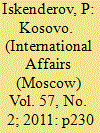

|
|
|
|
|
| Publication |
2011.
|
| Summary/Abstract |
THE ADVISORY OPINION issued by the International Court of Justice last June said that "the declaration of independence on the 17th of February 2008 did not violate general international law"; the Court, however, refused to recognize Kosovo as an international legal subject1 thus driving the Kosovo issue into a legal impasse. The Albanian authorities of Kosovo which looked forward to a prompt international recognition were disappointed: only two UN members (Honduras and Kiribati) joined the countries which had recognized Kosovo's self-proclaimed independence. Today there are 71 of them.2 In an absence of a more or less coherent EU Balkan policy, the contradictions between the Serbs and Albanians can be hardly settled within the framework of its integration models. On the one hand, Brussels accelerates negotiations between Belgrade and Pristina under supervision of Catherine Ashton, High Representative of the Union for Foreign Affairs and Security Policy; on the other, it destabilizes the situation in conflict zones elsewhere.
|
|
|
|
|
|
|
|
|
|
|
|
|
|
|
|
| 17 |
ID:
088209
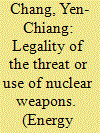

|
|
|
|
|
| Publication |
2009.
|
| Summary/Abstract |
This paper examines international treaties in relation to the threat or use of nuclear weapons including the 1968 Nuclear Non-Proliferation Treaty and the 1996 Comprehensive Test Ban Treaty. It can be concluded that the effect of the aforesaid international treaties is still in doubt without explicit enforcement mechanisms and penalty for non-compliance. This paper also reviews the International Court of Justice's advisory opinion on the legality of the threat or use of nuclear weapons and comments that a clear explanation on the legality of use of nuclear weapons in 'extreme circumstances of self-defence' is required. Examples from current state practice in relation to nuclear non-proliferation efforts are also provided, with special attention to China, North Korea and Iran. This paper suggests that China as a leader of developing countries should extend its efforts on nuclear non-proliferation and conduct communication between North Korea and Iran and other nuclear weapons states to reduce or prohibit nuclear weapons.
|
|
|
|
|
|
|
|
|
|
|
|
|
|
|
|
| 18 |
ID:
118192
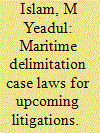

|
|
|
| 19 |
ID:
150315
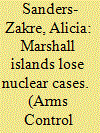

|
|
|
|
|
| Summary/Abstract |
The International Court of Justice on Oct. 5 dismissed on procedural grounds the cases filed by the Marshall Islands against India, Pakistan, and the United Kingdom, the first nuclear disarmament challenges brought before the court by a state. The Marshall Islands, a group of Pacific Ocean islands and atolls, still suffers from the effects of being used for nuclear tests by the United States from 1946 to 1958.
|
|
|
|
|
|
|
|
|
|
|
|
|
|
|
|
| 20 |
ID:
122192
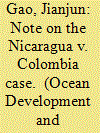

|
|
|
|
|
| Publication |
2013.
|
| Summary/Abstract |
The 2012 Nicaragua v. Colombia Case is the second instance where the International Court of Justice has employed the standard method in maritime delimitation since the 2009 Black Sea Case. The "standard method" involves three stages with the construction of a provisional equidistance line as the core of the methodology. There is no legal basis under the UN Convention on the Law of the Sea or customary law for the a priori position given to an equidistance line. Moreover, questions can be raised about the Court's operation at the second stage, which should consist of an adjustment or shifting of the provisional line rather than replacing it. Finally, the use of the disproportionality test as the touchstone for equity of the delimitation line is doubtful.
|
|
|
|
|
|
|
|
|
|
|
|
|
|
|
|
|
|
|
|
|